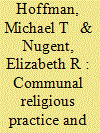| Srl | Item |
| 1 |
ID:
152418


|
|
|
|
|
| Summary/Abstract |
Does religion inevitably promote support for militant politics? Using a new and unique data set compiled from a nationally representative survey in Lebanon, we examine the conditions under which communal religious practice may serve to promote support for or opposition to armed parties. We argue that this relationship, far from being unidirectional and consistent, depends on the interests of the individual sectarian group. For groups engaged in conflict, communal prayer may increase support for arming political parties. For noncombatant groups, however, religion tends to promote opposition to such militarization. Using both observational and experimental evidence, we demonstrate that communal religion increases the salience of group interests through both identity and informational mechanisms. For regular worship attenders, communal religious practice increases the salience of sectarian identity. For nonattenders, informational primes about sectarian interests have the same effect. Among noncombatant groups, this increased salience leads to opposition to armed parties whose presence would threaten the livelihoods and security of those on the sidelines.
|
|
|
|
|
|
|
|
|
|
|
|
|
|
|
|
| 2 |
ID:
173008


|
|
|
|
|
| Summary/Abstract |
How does political polarization occur under repressive conditions? Drawing on psychological theories of social identity, the author posits that the nature of repression drives polarization. Repression alters group identities, changing the perceived distance between groups and ultimately shaping the level of affective and preference polarization between them through differentiation processes. The author tests the proposed causal relationship using mixed-method data and analysis.The results of a laboratory experiment reveal that exposure to a targeted repression prime results in greater in-group identification and polarization between groups, whereas exposure to a widespread prime results in decreased levels of these same measurements. The effect of the primes appears to be mediated through group identification. Case-study evidence of polarization between political opposition groups that were differently repressed in Egypt and Tunisia reinforces these results. The findings have implications for understanding how polarization, as conditioned by repression, may alter the likelihood of the cooperative behavior among opposition actors necessary for the success of democratic politics.
|
|
|
|
|
|
|
|
|
|
|
|
|
|
|
|